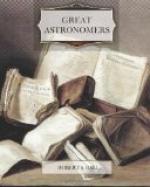Until his eightieth year Airy continued to discharge his labours at Greenwich with unflagging energy. At last, on August 15th, 1881, he resigned the office which he had held so long with such distinction to himself and such benefit to his country. He had married in 1830 the daughter of the Rev. Richard Smith, of Edensor. Lady Airy died in 1875, and three sons and three daughters survived him. One daughter is the wife of Dr. Routh, of Cambridge, and his other daughters were the constant companions of their father during the declining years of his life. Up to the age of ninety he enjoyed perfect physical health, but an accidental fall which then occurred was attended with serious results. He died on Saturday, January 2nd, 1892, and was buried in the churchyard at Playford.
HAMILTON.
William Rowan Hamilton was born at midnight between the 3rd and 4th of August, 1805, at Dublin, in the house which was then 29, but subsequently 36, Dominick Street. His father, Archibald Hamilton, was a solicitor, and William was the fourth of a family of nine. With reference to his descent, it may be sufficient to notice that his ancestors appear to have been chiefly of gentle Irish families, but that his maternal grandmother was of Scottish birth. When he was about a year old, his father and mother decided to hand over the education of the child to his uncle, James Hamilton, a clergyman of Trim, in County Meath. James Hamilton’s sister, Sydney, resided with him, and it was in their home that the days of William’s childhood were passed.
In Mr. Graves’ “Life of Sir William Rowan Hamilton” a series of letters will be found, in which Aunt Sydney details the progress of the boy to his mother in Dublin. Probably there is no record of an infant prodigy more extraordinary than that which these letters contain. At three years old his aunt assured the mother that William is “a hopeful blade,” but at that time it was his physical vigour to which she apparently referred; for the proofs of his capacity, which she adduces, related to his prowess in making boys older than himself fly before him. In the second letter, a month later, we hear that William is brought in to read the Bible for the purpose of putting to shame other boys double his age who could not read nearly so well. Uncle James appears to have taken much pains with William’s schooling, but his aunt said that “how he picks up everything is astonishing, for he never stops playing and jumping about.” When he was four years and three months old, we hear that he went out to dine at the vicar’s, and amused the company by reading for them equally well whether the book was turned upside down or held in any other fashion. His aunt assures the mother that “Willie is a most sensible little creature, but at the same time has a great deal of roguery.” At four years and five months old he came up to pay his mother a visit in town, and she writes to her sister a description of the boy;—




